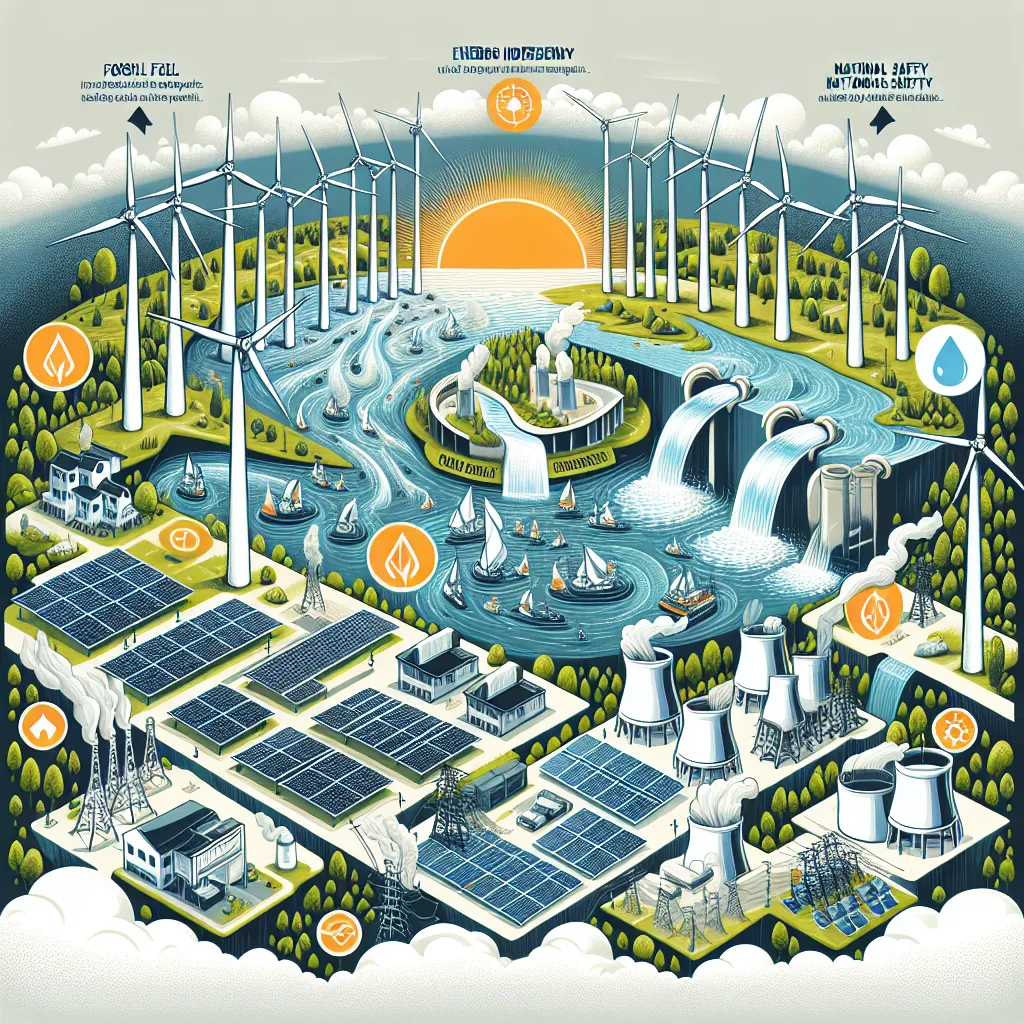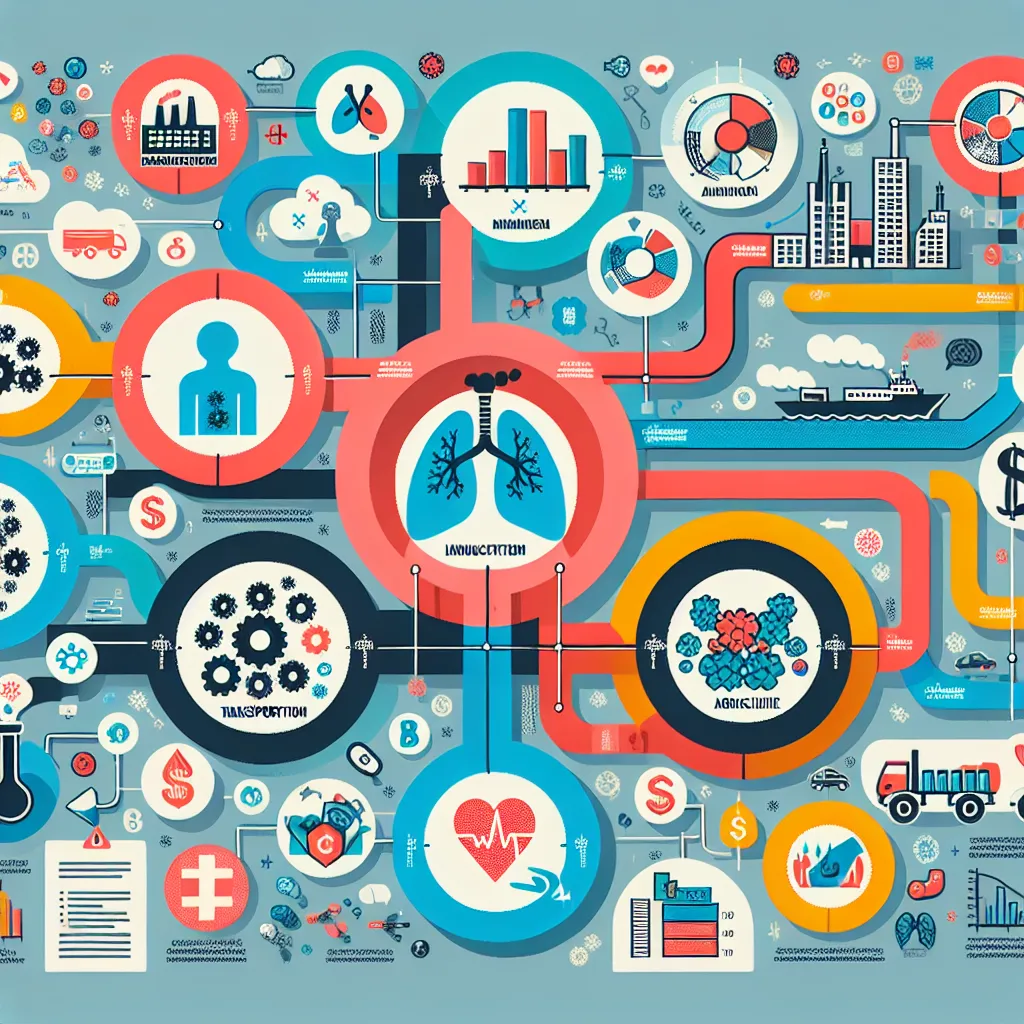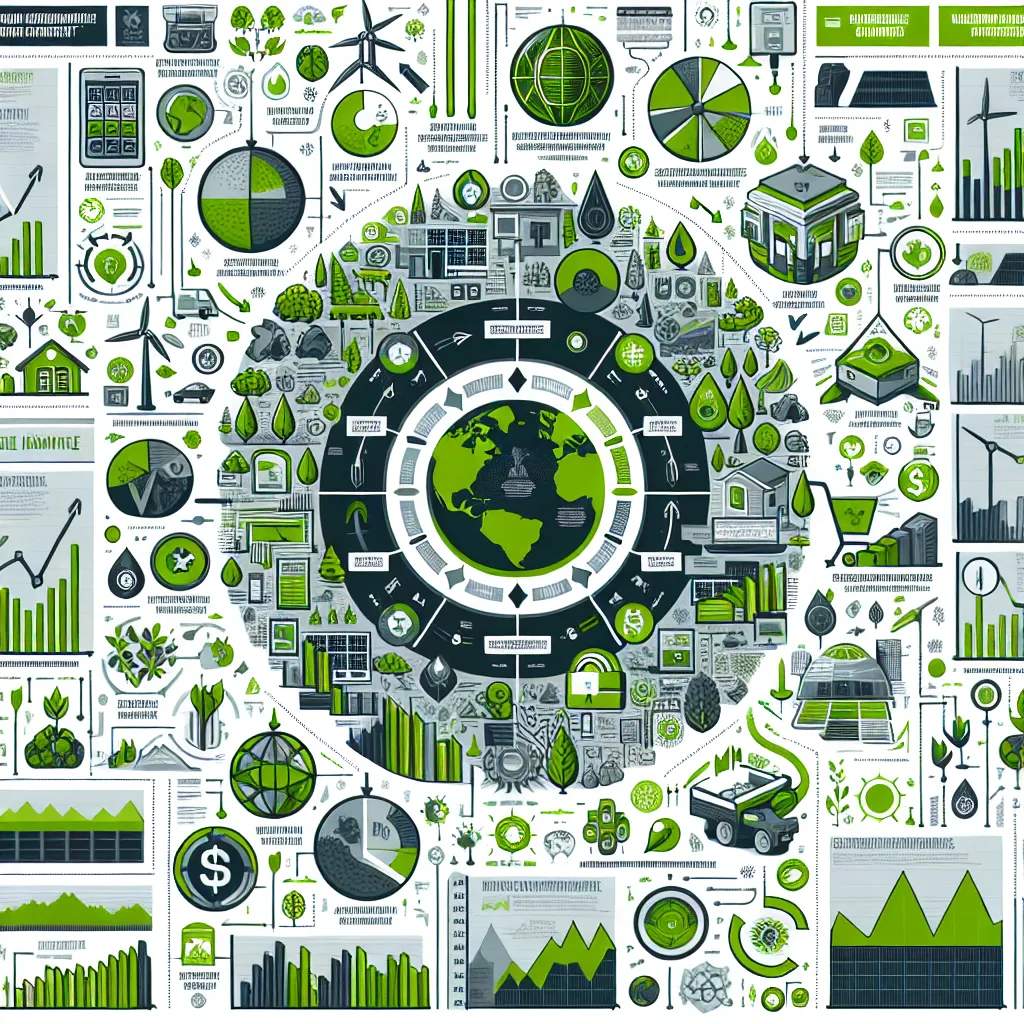Welcome to this IELTS Reading practice test focused on the topic “How renewable energy can help achieve energy independence.” This test is designed to simulate the real IELTS Reading exam, providing you with an opportunity to enhance your skills and familiarize yourself with the exam format. The test consists of three passages of increasing difficulty, accompanied by a variety of question types commonly found in the IELTS Reading section.
Nội dung bài viết
- Passage 1 – Easy Text
- The Promise of Renewable Energy
- Questions 1-7
- Questions 8-13
- Passage 2 – Medium Text
- The Path to Energy Independence Through Renewable Sources
- Questions 14-19
- Questions 20-26
- Passage 3 – Hard Text
- The Geopolitical Implications of Renewable Energy and Energy Independence
- Questions 27-32
- Questions 33-37
- Questions 38-40
- Answer Key
- Passage 1
- Passage 2
- Passage 3
 Renewable Energy Independence
Renewable Energy Independence
Passage 1 – Easy Text
The Promise of Renewable Energy
Renewable energy sources have gained significant attention in recent years as countries worldwide seek to reduce their dependence on fossil fuels and achieve energy independence. Unlike conventional energy sources, renewable energy is derived from natural processes that are replenished on a human timescale. These sources include solar, wind, hydropower, geothermal, and biomass energy.
One of the primary advantages of renewable energy is its potential to enhance energy security. By diversifying energy sources and reducing reliance on imported fossil fuels, countries can mitigate the risks associated with supply disruptions and price volatility in global energy markets. This shift towards domestically produced renewable energy can lead to greater energy independence and resilience in the face of geopolitical uncertainties.
Moreover, renewable energy technologies have experienced rapid advancements in recent years, resulting in increased efficiency and reduced costs. Solar panels and wind turbines, for instance, have become significantly more affordable and effective, making them increasingly viable alternatives to traditional power generation methods. As these technologies continue to improve, the transition to renewable energy becomes more economically feasible for many countries.
The adoption of renewable energy also brings environmental benefits. Unlike fossil fuels, which release greenhouse gases and contribute to climate change, renewable energy sources produce little to no emissions during operation. This reduction in carbon footprint aligns with global efforts to combat climate change and creates a more sustainable energy future.
However, the transition to renewable energy is not without challenges. Intermittency issues, such as the variability of sunlight and wind, require innovative solutions for energy storage and grid management. Additionally, the initial investment costs for renewable infrastructure can be substantial, although they are often offset by long-term savings and environmental benefits.
Despite these challenges, many countries are making significant strides in increasing their renewable energy capacity. As technology advances and policies evolve, the role of renewable energy in achieving energy independence is likely to grow, reshaping the global energy landscape in the process.
Questions 1-7
Do the following statements agree with the information given in the passage? Write
TRUE if the statement agrees with the information
FALSE if the statement contradicts the information
NOT GIVEN if there is no information on this
- Renewable energy sources are replenished faster than they are consumed.
- Energy independence can be achieved solely through the use of renewable energy.
- The cost of renewable energy technologies has decreased in recent years.
- Solar panels are more efficient than wind turbines in generating electricity.
- Renewable energy sources produce zero emissions during their entire lifecycle.
- The intermittency of renewable energy sources is a significant challenge.
- All countries have the same potential for adopting renewable energy technologies.
Questions 8-13
Complete the sentences below. Choose NO MORE THAN TWO WORDS from the passage for each answer.
- Renewable energy can help countries reduce their dependence on __ __.
- By diversifying energy sources, countries can increase their energy __ and __.
- The __ of renewable energy technologies has improved significantly in recent years.
- Renewable energy aligns with global efforts to combat __ __.
- The __ costs for renewable infrastructure can be high, but are often offset by long-term benefits.
- As technology and policies evolve, renewable energy is expected to reshape the __ __ __.
Passage 2 – Medium Text
The Path to Energy Independence Through Renewable Sources
The quest for energy independence has become a paramount concern for nations worldwide, driven by the need to reduce vulnerability to external energy shocks and mitigate the environmental impact of fossil fuels. Renewable energy sources have emerged as a promising solution to this challenge, offering a pathway to sustainable and self-sufficient energy production. This transition, however, requires careful planning, substantial investment, and technological innovation to overcome existing barriers and maximize the potential of clean energy alternatives.
One of the key advantages of renewable energy in achieving energy independence is its ubiquitous nature. Unlike fossil fuels, which are concentrated in specific geographic locations, renewable sources such as solar, wind, and hydropower are available to varying degrees in most countries. This widespread availability allows nations to tap into their indigenous energy resources, reducing the need for energy imports and enhancing energy security. For instance, countries with abundant sunshine can leverage solar power, while those with extensive coastlines can harness offshore wind energy.
The intermittent nature of some renewable sources, particularly solar and wind, has long been cited as a significant obstacle to their widespread adoption. However, rapid advancements in energy storage technologies are addressing this challenge. Battery systems, pumped hydro storage, and emerging technologies like hydrogen fuel cells are enabling the storage of excess energy generated during peak production periods for use during times of low production or high demand. These innovations are crucial in creating a stable and reliable renewable energy grid that can support energy independence.
Moreover, the decentralized nature of renewable energy systems offers additional benefits for energy security. Traditional centralized power plants are vulnerable to disruptions from natural disasters, cyber-attacks, or other threats. In contrast, a network of distributed renewable energy sources and microgrids can enhance resilience by reducing the impact of localized disruptions on the overall energy supply. This decentralization also empowers communities and individuals to generate their own energy, further contributing to energy independence at multiple levels.
The transition to renewable energy also has significant economic implications. While the initial capital costs for renewable infrastructure can be substantial, the long-term economic benefits are increasingly apparent. Renewable energy technologies have experienced dramatic cost reductions in recent years, with solar and wind power becoming cost-competitive with fossil fuels in many markets. Furthermore, investment in renewable energy creates domestic jobs in manufacturing, installation, and maintenance, contributing to economic growth and reducing dependence on foreign energy markets.
However, achieving energy independence through renewable sources is not without challenges. The integration of large-scale renewable energy into existing power grids requires significant upgrades to transmission and distribution infrastructure. Additionally, the variability of renewable energy production necessitates the development of advanced grid management systems and demand response mechanisms to balance supply and demand effectively.
Policy support plays a crucial role in accelerating the transition to renewable energy and achieving energy independence. Governments worldwide are implementing a range of measures, including feed-in tariffs, renewable portfolio standards, and carbon pricing mechanisms, to incentivize renewable energy adoption and discourage fossil fuel consumption. International cooperation and technology transfer are also essential in helping developing countries leapfrog to clean energy technologies and achieve their energy independence goals.
As the world grapples with the dual challenges of energy security and climate change, the role of renewable energy in achieving energy independence becomes increasingly vital. While obstacles remain, the continuous technological advancements, declining costs, and growing policy support for renewable energy are paving the way for a more sustainable and independent energy future. The transition to renewable energy not only promises greater energy security but also offers a path to economic prosperity and environmental sustainability, making it a compelling solution for nations seeking to achieve true energy independence.
Questions 14-19
Choose the correct letter, A, B, C, or D.
-
What is described as a key advantage of renewable energy for achieving energy independence?
A) Its low cost
B) Its widespread availability
C) Its high efficiency
D) Its ease of implementation -
Which of the following is NOT mentioned as a renewable energy source in the passage?
A) Solar power
B) Wind energy
C) Hydropower
D) Nuclear energy -
According to the passage, what is helping to address the intermittent nature of some renewable sources?
A) Increased fossil fuel production
B) Advancements in energy storage technologies
C) Reduction in energy consumption
D) Improvement in weather prediction -
How does the decentralized nature of renewable energy systems contribute to energy security?
A) By increasing dependence on foreign energy
B) By centralizing power production
C) By reducing the impact of localized disruptions
D) By eliminating the need for a power grid -
What economic benefit of renewable energy is highlighted in the passage?
A) Immediate reduction in energy costs
B) Creation of domestic jobs
C) Elimination of all energy-related expenses
D) Increased profits for fossil fuel companies -
Which of the following is described as a challenge in achieving energy independence through renewable sources?
A) Lack of sunlight and wind in most countries
B) Upgrading transmission and distribution infrastructure
C) Decreasing efficiency of renewable technologies
D) Opposition from the public
Questions 20-26
Complete the summary below. Choose NO MORE THAN TWO WORDS from the passage for each answer.
The transition to renewable energy offers a path to energy independence, but it requires careful planning and innovation. Renewable sources like solar and wind are (20) __ in most countries, reducing the need for energy imports. While the (21) __ nature of some renewables poses challenges, advancements in (22) __ technologies are providing solutions. The (23) __ nature of renewable systems enhances resilience against disruptions. Despite high initial costs, renewable energy brings long-term economic benefits, including job creation and reduced dependence on (24) __ markets. However, integrating renewables into existing grids requires significant (25) __ upgrades. Government (26) __ is crucial in accelerating the transition to renewable energy and achieving energy independence.
Passage 3 – Hard Text
The Geopolitical Implications of Renewable Energy and Energy Independence
The global transition towards renewable energy sources is not merely a technological shift; it represents a fundamental realignment of the geopolitical landscape that has been shaped by fossil fuel dependencies for over a century. As nations increasingly turn to indigenous renewable resources to meet their energy needs, the traditional power dynamics centered around oil and gas-rich countries are being recalibrated, with far-reaching implications for international relations, economic structures, and global security paradigms.
The pursuit of energy independence through renewable sources is dismantling the longstanding geopolitical leverage held by fossil fuel exporters. Countries that have historically wielded significant influence due to their hydrocarbon reserves are facing a gradual erosion of their strategic importance. This shift is particularly pronounced in regions like the Middle East, where oil exports have long been a cornerstone of economic and political power. As major energy consumers reduce their reliance on fossil fuel imports, the geopolitical clout associated with oil and gas reserves diminishes, necessitating economic diversification and new strategic considerations for traditional energy exporters.
Conversely, the renewable energy transition is empowering a new cohort of countries rich in renewable resources or advanced technological capabilities. Nations with abundant solar, wind, or hydroelectric potential are emerging as new energy powerhouses, while countries at the forefront of renewable technology development and manufacturing, such as China and Germany, are positioning themselves as leaders in the new energy paradigm. This reconfiguration of energy geopolitics is creating novel interdependencies and alliances, as countries collaborate on renewable energy projects, technology transfer, and the establishment of new energy corridors.
The decentralized nature of renewable energy systems is also reshaping the concept of energy security. Unlike the centralized and vulnerable infrastructure associated with fossil fuels, renewable energy systems offer a more distributed and resilient approach to energy production. This shift reduces the risk of supply disruptions due to geopolitical tensions, natural disasters, or targeted attacks on critical infrastructure. Moreover, the localization of energy production enhances community resilience and reduces dependence on distant energy sources, potentially mitigating conflicts driven by resource competition.
However, the transition to renewable energy and the pursuit of energy independence are not without geopolitical challenges. The global rush to secure critical minerals and rare earth elements essential for renewable technologies has sparked new forms of resource competition. Countries are vying for control over reserves of lithium, cobalt, and neodymium, among others, leading to concerns about the emergence of new resource monopolies and supply chain vulnerabilities. This competition underscores the need for diversified supply chains, recycling initiatives, and technological innovations to reduce dependence on scarce materials.
Furthermore, the uneven pace of the renewable energy transition across different regions is creating new geopolitical fault lines. Countries and regions leading in renewable energy adoption and technology development may gain significant economic and diplomatic advantages, potentially exacerbating global inequalities. There is a risk of a “green divide” emerging between nations with the capacity to transition quickly to renewable energy and those lacking the necessary resources or technological know-how. International cooperation and support mechanisms are crucial to ensure a just and equitable energy transition that does not leave vulnerable countries behind.
The shift towards renewable energy is also intertwined with broader geopolitical trends, such as the growing emphasis on climate change mitigation. As countries align their energy policies with climate goals, new forms of diplomatic leverage are emerging. Nations leading in renewable energy and climate action are gaining moral authority and soft power on the global stage, influencing international negotiations and shaping global norms around sustainable development.
Moreover, the renewable energy transition is influencing military strategies and defense considerations. The reduced need for securing fossil fuel supply lines and protecting oil shipments is altering military priorities and force structures. Simultaneously, the vulnerability of renewable energy infrastructure to cyber attacks and the potential weaponization of critical minerals are creating new security challenges that require innovative defense strategies.
The integration of renewable energy into the global energy mix is also fostering new forms of energy diplomacy. Cross-border renewable energy projects, such as interconnected power grids and joint offshore wind farms, are creating platforms for regional cooperation and conflict resolution. These collaborative endeavors have the potential to build trust and interdependence among neighboring countries, contributing to regional stability and peace.
As the world progresses towards a renewable energy future, the geopolitical landscape is being profoundly reshaped. The transition offers opportunities for greater energy independence, reduced conflict over resources, and enhanced global cooperation on sustainable development. However, it also presents new challenges that require careful navigation. Policymakers, diplomats, and strategic thinkers must adapt to this evolving geopolitical reality, recognizing both the transformative potential of renewable energy and the complexities inherent in this global transition. By fostering inclusive international cooperation, promoting equitable access to renewable technologies, and addressing emerging security concerns, the global community can harness the geopolitical opportunities presented by the renewable energy revolution while mitigating potential risks and conflicts.
Questions 27-32
Complete the sentences below. Choose NO MORE THAN TWO WORDS AND/OR A NUMBER from the passage for each answer.
- The transition to renewable energy is causing a __ of traditional power dynamics centered around fossil fuel-rich countries.
- Countries with significant __ reserves are experiencing a decline in their strategic importance as major energy consumers reduce fossil fuel imports.
- The __ nature of renewable energy systems is changing the concept of energy security by offering a more distributed approach to energy production.
- The global competition for __ essential for renewable technologies has created new forms of resource competition.
- There is a concern about the emergence of a “__” between nations that can quickly transition to renewable energy and those that cannot.
- The renewable energy transition is influencing __ strategies by altering priorities related to securing fossil fuel supply lines.
Questions 33-37
Do the following statements agree with the claims of the writer in the passage? Write
YES if the statement agrees with the claims of the writer
NO if the statement contradicts the claims of the writer
NOT GIVEN if it is impossible to say what the writer thinks about this
- The transition to renewable energy will completely eliminate geopolitical tensions related to energy resources.
- Countries leading in renewable energy adoption may gain significant economic and diplomatic advantages over others.
- The renewable energy transition is expected to reduce global inequalities between nations.
- Cross-border renewable energy projects have the potential to improve regional stability and cooperation.
- All countries have equal access to the technologies and resources needed for a transition to renewable energy.
Questions 38-40
Choose the correct letter, A, B, C, or D.
-
According to the passage, which of the following is a potential benefit of the renewable energy transition for international relations?
A) Increased competition for fossil fuels
B) Enhanced regional cooperation through joint energy projects
C) Strengthened power of traditional oil-exporting countries
D) Reduced need for international energy agreements -
What new security challenge related to renewable energy is mentioned in the passage?
A) Piracy of oil tankers
B) Nuclear proliferation
C) Vulnerability of renewable infrastructure to cyber attacks
D) Increased military conflicts over oil reserves -
How does the passage suggest countries can best navigate the geopolitical changes brought by the renewable energy transition?
A) By increasing fossil fuel production
B) By isolating themselves from global energy markets
C) By fostering inclusive international cooperation and promoting equitable access to renewable technologies
D) By focusing solely on domestic energy production without regard for global trends
Answer Key
Passage 1
- TRUE
- NOT GIVEN
- TRUE
- NOT GIVEN
- FALSE
- TRUE
- NOT GIVEN
- fossil fuels
- security, resilience
- efficiency
- climate change
- initial
- global energy landscape
Passage 2
- B
- D
- B
- C
- B
- B
- available
- intermittent
- storage
- decentralized
- foreign
- infrastructure
- policy support
Passage 3
- recalibration


